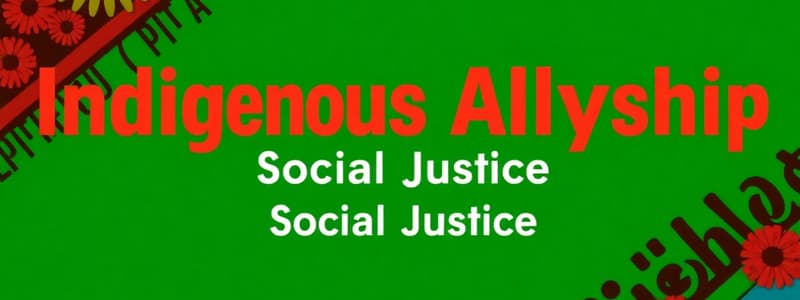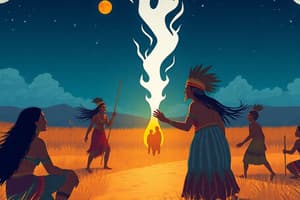Podcast
Questions and Answers
What is a key characteristic that distinguishes allies in the context of Indigenous allyship?
What is a key characteristic that distinguishes allies in the context of Indigenous allyship?
- Holding positions of leadership within Indigenous communities.
- Promoting their own cultural practices within Indigenous spaces.
- Actively engaging in decolonizing processes. (correct)
- Providing financial support without direct involvement.
Why is building relationships considered the first step in allyship with Indigenous people?
Why is building relationships considered the first step in allyship with Indigenous people?
- To expedite the process of reconciliation on one's own terms.
- To overcome distrust resulting from colonization and exploitation. (correct)
- To gain access to resources and assert expertise.
- To quickly establish trust and assume leadership roles.
How does learning about Indigenous peoples' culture contribute to resisting colonization as a non-Indigenous person?
How does learning about Indigenous peoples' culture contribute to resisting colonization as a non-Indigenous person?
- It helps in appropriating cultural practices for personal gain.
- It reinforces the goal of settler-colonialism by assimilating cultures.
- It keeps knowledge and cultures alive, opposing settler-colonialism. (correct)
- It allows non-Indigenous people to become experts on Indigenous cultures.
What is a crucial aspect of listening, in the context of allyship with Indigenous communities?
What is a crucial aspect of listening, in the context of allyship with Indigenous communities?
Why should allies avoid 'seeking emotional support' from Indigenous people?
Why should allies avoid 'seeking emotional support' from Indigenous people?
How does the Western/Canadian perspective on land typically contrast with that of Indigenous cultures?
How does the Western/Canadian perspective on land typically contrast with that of Indigenous cultures?
According to Alfred and Corntassel (2005), where does decolonization primarily begin?
According to Alfred and Corntassel (2005), where does decolonization primarily begin?
What should allies do in order to take effective action?
What should allies do in order to take effective action?
What does intersectionality refer to in the context of privilege and oppression?
What does intersectionality refer to in the context of privilege and oppression?
Why is it important to understand that one can never truly comprehend the oppression that Indigenous people feel?
Why is it important to understand that one can never truly comprehend the oppression that Indigenous people feel?
Which action is an example of cultural appropriation?
Which action is an example of cultural appropriation?
What should allies do if Indigenous people have conflicts in a struggle?
What should allies do if Indigenous people have conflicts in a struggle?
What does it mean for allies to 'take leadership'?
What does it mean for allies to 'take leadership'?
Why is it important for non-Indigenous people to reflect and acknowledge their motivations as allies?
Why is it important for non-Indigenous people to reflect and acknowledge their motivations as allies?
What is the meaning behind allies building relationships?
What is the meaning behind allies building relationships?
In terms of history, what is one crucial element to take into consideration?
In terms of history, what is one crucial element to take into consideration?
As an ally, is it important to have expectations?
As an ally, is it important to have expectations?
What happens when you learn about privilege and oppression?
What happens when you learn about privilege and oppression?
Why are conflicts over resources significant?
Why are conflicts over resources significant?
What is the purpose of contacting the government?
What is the purpose of contacting the government?
Why is it critical that the Indigenous people deem actions acceptable and beneficial?
Why is it critical that the Indigenous people deem actions acceptable and beneficial?
What is the relationship between Indigenous people and Land?
What is the relationship between Indigenous people and Land?
Why should allies let Indigenous people speak in public?
Why should allies let Indigenous people speak in public?
What might be the result of the implementation of harmful policies and practices?
What might be the result of the implementation of harmful policies and practices?
What is a key element for building relationships as an Indigenous ally?
What is a key element for building relationships as an Indigenous ally?
Flashcards
What is an ally?
What is an ally?
Non-Indigenous people actively engaging in decolonizing processes with two key characteristics: desire to support social justice and offering support through meaningful relationships.
What is Allyship?
What is Allyship?
A continuous process of re-evaluation and self-reflection to align with Indigenous perspectives. It's a journey without a definitive end, with allyship recognized differently by individuals.
Decolonization
Decolonization
It starts with awareness of how actions/lives benefit or contribute to colonial relations. It also means shifting behavior to challenge colonial relations.
Relationships with Indigenous People
Relationships with Indigenous People
Signup and view all the flashcards
Privilege and Oppression
Privilege and Oppression
Signup and view all the flashcards
Learn the History
Learn the History
Signup and view all the flashcards
People and Culture
People and Culture
Signup and view all the flashcards
Importance of Land
Importance of Land
Signup and view all the flashcards
Listening
Listening
Signup and view all the flashcards
Act
Act
Signup and view all the flashcards
Cultural Appropriation
Cultural Appropriation
Signup and view all the flashcards
Take Leadership
Take Leadership
Signup and view all the flashcards
Interfere
Interfere
Signup and view all the flashcards
Seek Emotional Support
Seek Emotional Support
Signup and view all the flashcards
Have Expectations
Have Expectations
Signup and view all the flashcards
Study Notes
Indigenous Allyship Overview
- It explores what it means to be an ally, listing positive and negative practices
What Is An Ally
- Non-Indigenous people must actively engage in decolonization to qualify as allies
- Allies support social justice, promote the rights of non-dominant groups and want to eliminate social inequalities that allies benefit from
- Allies support meaningful relationships with people and communities of non-dominant groups to ensure accountability
Allyship as a Continual Process
- Becoming an ally is a continuous process involving constant re-evaluation and critical self-reflection to align with Indigenous people
- Allyship is a journey with the distant goal of 'being an ally' which is never truly in reach, as allyship is based on individual perception
Decolonization
- Decolonization manifests as broad social and political movements to challenge state agendas and authorities
- Decolonization starts with individuals gaining awareness of how their actions and lives benefit or contribute to the colonial structure and disenfranchisement of Indigenous Peoples
- Decolonization involves gaining awareness and changing behavior to challenge colonial relations
Positive Practices to be an Ally
- Build relationships
- Learn about privilege and oppression
- Learn the history
- People and the culture
- Land: Learning and understanding
- Listening
- Act: Allies have a responsibility to act
Building Relationships
- Building relationships with Indigenous People is the first step to decolonization due to colonization-driven distrust
- Relationship building involves acting in solidarity and allowing Indigenous people to make decisions, not taking the lead
- Meaningful coexistence relies on accountability and responsibility generated by relationships
Privilege and Oppression
- Learning about oppression and privilege is important including the history of colonization, Indigenous people, cultures, and the land
- Oppression is embedded structurally and systemically within Canadian systems and institutions
- The Canadian government has embedded inequitable systems that disadvantage Indigenous people while privileging settler populations
- It is important to understand that one cannot truly comprehend the oppression Indigenous people feel
- Privilege determines success based on positionality (race, ethnicity, gender, etc.) and intersectionality, not solely on hard work
- Privilege is when people and groups gain unearned advantages that increase their power at others' expense
History
- History needs to be viewed from the perspective of Indigenous people, not the dominant society
- History is always political because the mainstream education system imparts the colonizer's view.
- A lot of shared history remains unacknowledged, especially history from Indigenous perspectives
- Conflict over resources has fueled racist and genocidal policies and laws over the past 200 years to assimilate Indigenous populations
Peoples and The Culture
- Understanding the 'other' comes from relationship building and interaction
- Learning Indigenous cultural practices, histories, beliefs, and languages contributes to the re-indigenization of Indigenous peoples
- Learning about Indigenous culture resists colonization by keeping knowledge alive
Land
- It is important to understand the ontological and epistemological significance of Indigenous cultures' relationship with land
- Indigenous relationship with the land differs completely from the Western/Canadian perspective
- Western/Canadian relationship with land is hierarchical, but the Indigenous people and cultures relationship with land is horizontal and based on respect and reciprocity
- Mohawk College sits on traditional Haudenosaunee and Anishinaabe land, legally recognized as Haudenosaunee land through the Haldimand Treaty of 1784
Listening
- Relationships require listening and understanding with an open mind and heart
- An inability to value other cultures is embedded Western and Canadian culture
- Allyship involves supporting Indigenous people and valuing their voices, not leading
- You must want to listen to listen effectively
Act
- Accountability is promoted through solidarity action with Aboriginal people and communities
- Educating non-Aboriginal People on privilege and oppression is essential
- Reflect upon the intentions and motivations of why you are an ally
- Allies can advocate for self-interest (protecting loved ones), altruism (white/settler guilt), or addressing the root causes of oppression through a philosophy and commitment to better society
Approach Political Representatives
- Use your voices to contact the government and offer support to the process of decolonization
- Use your rights to vote, mobilize, to demand government to make change
Negative Practices to Being an Ally
- Cultural Appropriation
- Take Leadership
- Interfere
- Seek emotional support
- Have Expectations
Cultural Appropriation
- Acquiring intellectual property, cultural expressions or artifacts from another culture, is cultural appropriation
- Unauthorized use of another culture's dance, music, language, medicine, or ceremonial practice is cultural appropriation
- Source community being oppressed or exploited in other ways is harmful when objects of significance are considered
- Cultural appropriation can be overt or subtle
Take Leadership
- It is disempowering for non-Indigenous people to take the lead or act on behalf of Indigenous people
- Speak in public for Indigenous people only if asked
- Taking over is related to the "Western savior Complex" stereotype
Interfere
- Indigenous peoples and Nations are not homogenous
- There is diversity within and between different Nations, which produces conflict
- Allies should never intrude or interfere during community struggles without explicit invitations
- Allies should allow Indigenous people to make important decisions, and should not attempt to take over a situation
- Interference limits self-determination
Seek Emotional Support
- Do not seek emotional support from Indigenous people
- Indigenous people need their energy for their own struggles
- It is disrespectful and counterproductive to add on to their burden
- Seeking support from a friend is different than seeking that from an Indigenous person
Have Expectations
- Do not be grateful to have Indigenous people as allies
- Harmful practices have created a climate of distrust and hesitance
- You should not expect to be welcomed warmly
- Building community and trust takes time, dedication, humility, and consistent commitments
Studying That Suits You
Use AI to generate personalized quizzes and flashcards to suit your learning preferences.




